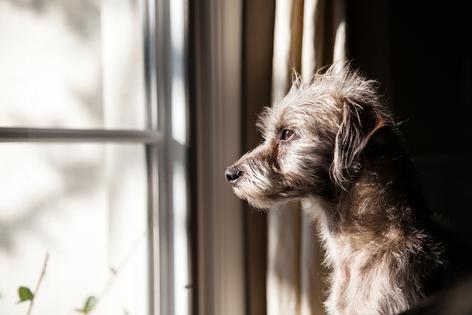My Pet World: Indoor accidents in older dogs — What you can do
Dear Cathy,
I enjoy your column each week, but I have never seen my problem mentioned. We have a 16-year-old Schnauzer/Yorkie rescue boy. He is a wonderful dog, but he is getting very old.
A couple of years ago, we started using doggie diapers in the house because he was beginning to experience incontinence. That has helped tremendously. Now we have a new issue. We walk him regularly, but often he doesn’t poop or poops only a small amount. When he’s home, he then poops on the floor. I think he has trouble maintaining his “pooping stance” outside, and he feels more secure inside. Is there anything I can do?
— Harriette, Newsday reader from Boca Raton, Florida
Dear Harriette,
You are very observant, as dogs are most vulnerable when they are in that position. So, yes, he probably feels incredibly vulnerable and nervous about pooping outside. At 16, your little guy may also be dealing with joint discomfort, reduced muscle tone, and even slight cognitive decline, all of which can make the process of pooping outside more difficult or confusing.
Here are a few things you can try to help him:
Make sure there’s no underlying medical condition causing him discomfort when he tries to poop. Arthritis, spinal issues, and gastrointestinal discomfort can make pooping physically difficult or painful, especially when trying to balance in that classic squat.
Try walking him during warmer parts of the day when his muscles are less stiff, or shorten the walks and bring him to a familiar grassy or quiet spot, and wait. Some older dogs need more time to feel comfortable enough to go.
If he really feels safest inside, you can try setting up an indoor potty area with pee pads or a washable turf patch in a corner of your home. You might even transition him to pooping there regularly, so it's not on the floor. It’s not ideal, but with senior pets, sometimes we make accommodations that help them age gracefully.
If he does poop outside, give him lots of praise and a treat right away. Reinforcing the behavior may encourage him to go outdoors again.
You’ve done such a good job managing his incontinence with diapers, and your continued care and patience show how much he is loved. With a few small adjustments, you may be able to reduce the accidents and help him feel more secure, whether he's inside or out.
Dear Cathy,
I recently adopted two male, five-year-old Jack Russell/pug mixes. They both mostly resemble pugs with overbites and curly tails. They are friendly, affectionate, loving, and cuddly, and are trained in basic commands such as sit, stay, and come. What they lack is bathroom house training. I recently read that pugs are particularly hard to house train. Probably, there was an attempt to do so by their previous family. I’m at my wits’ end to solve this problem. Any advice?
— Linda, Annapolis, Maryland
Dear Linda,
House training older dogs can be challenging, especially if their previous home didn’t provide consistent training, or worse, if they were kept in conditions where they had no choice but to eliminate inside the home. The good news is that your two new boys are smart and capable of learning, regardless of their age or breed. It just sometimes takes a bit more time and patience, and many people give up too soon.
Begin by returning to the basics. Take them outside after every meal, nap, and playtime. Praise them enthusiastically when they go outside. Supervise them closely indoors, and if you catch them in the act, interrupt gently and guide them outside. Clean accidents thoroughly with an enzymatic cleaner to remove lingering odors that can prompt repeat mistakes.
In the meantime, consider using belly bands, which are a temporary solution for male dogs who are still learning. A belly band is a soft, fabric wrap that fits around your dog’s midsection, covering the area where urine would be released. It doesn’t prevent the dog from urinating; it simply catches the urine, much like a diaper, helping to protect your floors while you continue training. Or you could use a diaper. Just be sure to check and change them frequently to prevent skin irritation.
Most of all, be consistent and stick with the same routine every day. Consistency and kindness go a long way with rescued dogs, especially those who are just now getting the structured guidance they may have missed out on. Given enough time, they will learn.
______
______
========
(Cathy M. Rosenthal is a longtime animal advocate, author, columnist and pet expert who has more than 25 years in the animal welfare field. Send your pet questions, stories and tips to cathy@petpundit.com. Please include your name, city, and state. You can follow her @cathymrosenthal.)
©2025 Tribune Content Agency, LLC.
(c) 2025 DISTRIBUTED BY TRIBUNE MEDIA SERVICES, INC.












Comments